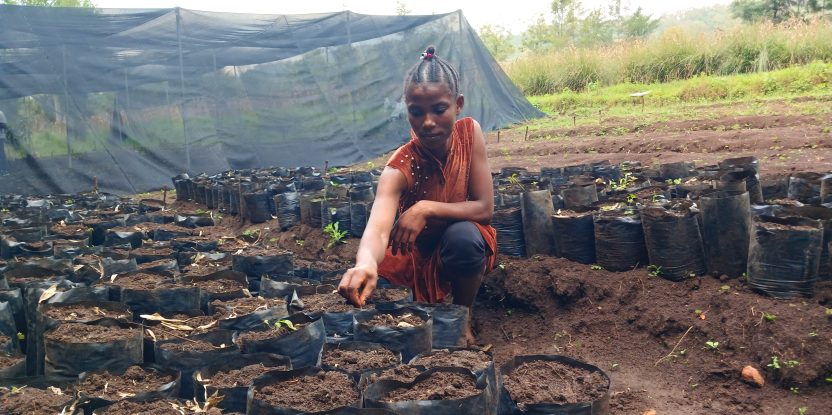
Selamawit Bekele , 22, lives in Tumata Chreta, a rural area in the Wongao District, Gedeo Zone, South Ethiopia Region. When she reached fifth grade, her parents informed her that they could no longer support her education. “In my village, when I was growing up, some parents helped their children with schooling,” Selamawit explains. “My parents couldn’t, so they told me I’d have to help myself.” At just 11, she began selling bananas and avocados harvested from her parents’ farm to cover school costs, allowing her to study through eighth grade. Financial barriers, however, prevented her from continuing to high school in nearby Wonago, the district’s capital.
“In rural areas, most young women’s futures involve marriage,” Selamawit says. “However, today, it’s no longer arranged by parents. A girl is approached by a boy and if she likes him, they marry. Some girls, though, may never get the chance and the community often view them as failures.” Over the years, marrying has become more than the sole question of love or attractiveness. The limited land available in Tumata Chreta is also a reason for many young men to prefer celibacy, adding to the uncertainty faced by Selamawit and other young women in her community, who dread the idea of staying long in their locality jobless and unmarried.
Despite the constraints of tradition, Selamawit’s aspirations and dreams stretch far beyond her village. “I dream of moving to a big city like Hawassa or Addis Ababa and opening my beauty salon,” she shares.
The young woman is one of the 11 beneficiaries of the newly established Rural Resource Center (RRC) in Tumata Chreta. Supported by the Center for International Forestry Research and World Agroforestry (CIFOR-ICRAF) project, Multifunctional Agroforestry for Enhanced Biodiversity, Improved Livelihood, and Resilient Landscapes in Ethiopian Highlands, the center is designed to support sustainable livelihoods and helping young people like Selamawit achieve their ambitions.
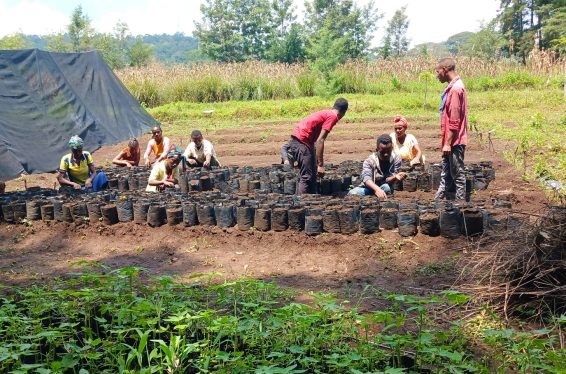
The youths are weeding the pots in which they recently planted avocado seeds. Photo by Eyob Getahun / CIFOR-ICRAF
Gedeo is a region renowned for its traditional agroforestry practices. This traditional landscape was recognised by the United Nations Educational, Scientific and Cultural Organisation (UNESCO) as a World Heritage Site in September 2023, underscoring the global importance of Gedeo’s agricultural heritage. Now, the site is one of the implementation areas for the CIFOR-ICRAF project, aimed to support both the environment and the livelihoods of Gedeo’s youth.
A new resource for local youth
In Tumata Chreta, including Selamawit, 11 unemployed youth are leading an ambitious project at the RRC. Previously a government nursery, the resource centre was revitalized in August 2024 as part of a broader initiative to foster biodiversity and resilience in Ethiopia’s highlands. The centre provides local youth with resources and training to grow and sell fruit tree seedlings, focusing on improved varieties of avocados and other native species.
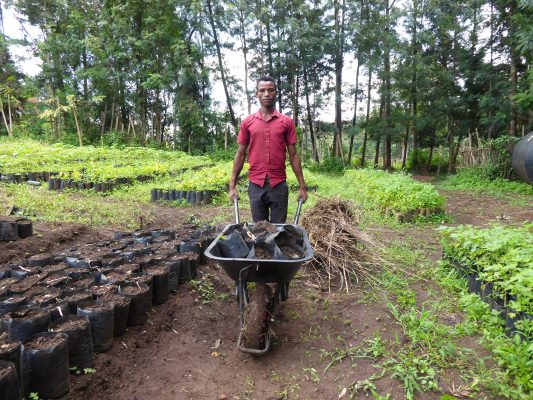
Yohannes Bekele carries seedlings. Photo by Eyob Getahun / CIFOR-ICRAF
For these young entrepreneurs, the RRC offers a rare opportunity. By cultivating highly sought-after seedlings, they can support themselves financially and contribute to their community’s agricultural landscape. “This work benefits both us and the community as we supply improved avocado trees,” says Yohannes Bekele, another beneficiary of the RRC. “We can sell seedlings, scions (young shoots used for grafting) and plant trees on our family’s land to sell the fruits.”
The improved variety of avocado seedlings fetches around 100 birrs (approximately USD 0.80) each in local markets. With an annual target of 6,000 seedlings, if used effectively, the center has the potential to generate nearly 600,000 birrs (approximately USD 4,700) from the sale of the seedlings, a substantial income for a rural area. Avocados are not only a valued source of nutrition for farming families, but they also serve as a significant source of income, with the fruit still selling for up to 10 birrs in the off-season.
A new generation of avocado trees
“Our avocado trees grow tall, making it challenging to harvest their fruit,” says Selamawit.“However, the improved varieties we are cultivating are shorter, allowing us to pick fruits while standing on the ground. Additionally, these grafted trees bear fruits within a shorter time frame— just three years.” In contrast, traditional non-grafted avocado trees take seven years to produce fruit.
The project has provided shade nets and various nursery materials to local RRCs. In a few months, the project will also supply scions for grafting. Beneficiaries at the Gedeo RRC recently participated in a two-day training course, which covered selecting the right avocado seed and raising, grafting and nurturing avocado seedlings. The training was conducted in collaboration with Dilla University, a project partner. “After the training, we conducted a practical assessment and confirmed the youth had acquired the skills needed,” says Nigussu Debebe, a lecturer from Dilla University.
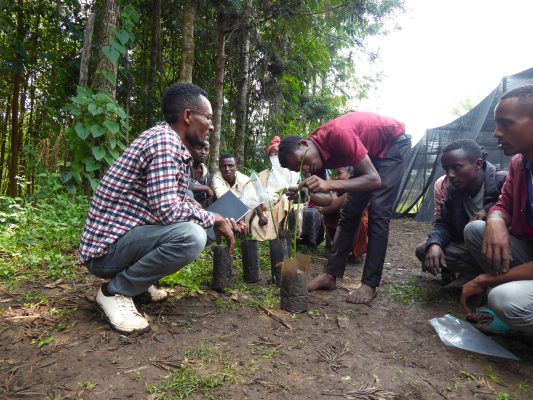
Nigussu Debebe (left) demonstrated grafting techniques to the youth. Photo by Eyob Getahun / CIFOR-ICRAF
However, without the establishment of mother trees, the long-term sustainability of the RRC remains uncertain. While the CIFOR-ICRAF project can initially supply scions, in the future, the youth will need to source these from mother trees they cultivate, with the potential to sell any surplus scions as an additional income stream. The support of the local administration is also commendable for ensuring the RRC’s long-term success. Tatek Dori, Deputy Administrator and Head of the Agriculture Department for the Gedeo Zone has pledged land for this purpose. “We will allocate a plot adjacent to the shade net area for establishing mother trees,” Tatek said. The project will also provide technical support to ensure the initiative’s sustainability.
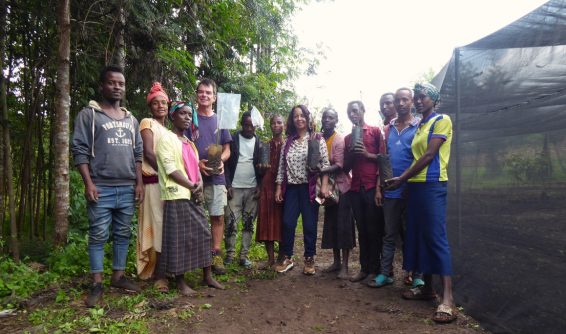
The youths running the RRC with Aster Gebrekirstos, from CIFOR-ICRAF, and Robert Marchant, from the University of York, a project partner. Photo by Eyob Getahun / CIFOR-ICRAF
Aster Gebrekirstos, the project coordinator and senior global scientist at CIFOR-ICRAF, highlights the broader ambitions of the RRC initiative: “The RRC will not only focus on producing high-value fruit trees but will also prioritize Indigenous multipurpose species critical for the sustainability of traditional agroforestry systems and biodiversity conservation.” In addition to the RRC established in Gedeo, a parallel centre has been established in Seleklekha, Tigray Region, Northern Ethiopia.
For Selamawit, this project has brought hope. “With the support of this project, I hope to realize my dream of owning a beauty salon one day,” says the bright young woman, her voice filled with optimism.
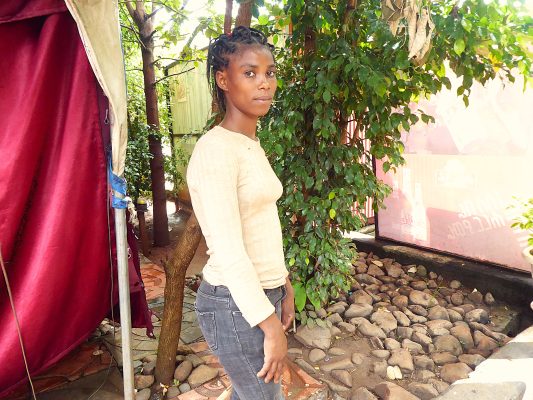
Selamawit looks forward to changing her life with the support of the CIFOR-ICRAF project. Photo by Eyob Getahun / CIFOR-ICRAF
This initiative is part of the Global Center on Biodiversity for Climate, which is funded by the UK’s Department for Environment, Food and Rural Affairs. It works in partnership with DAI Global as the Fund Manager Lead and the Royal Botanic Gardens, Kew, as the Strategic Science Lead.
We want you to share Forests News content, which is licensed under Creative Commons Attribution-NonCommercial-ShareAlike 4.0 International (CC BY-NC-SA 4.0). This means you are free to redistribute our material for non-commercial purposes. All we ask is that you give Forests News appropriate credit and link to the original Forests News content, indicate if changes were made, and distribute your contributions under the same Creative Commons license. You must notify Forests News if you repost, reprint or reuse our materials by contacting forestsnews@cifor-icraf.org.